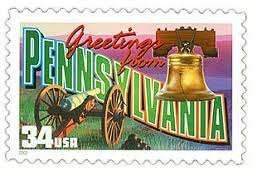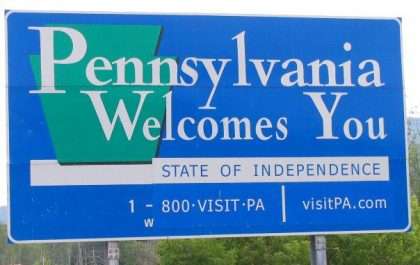Pro-Pennsylvania Online Gambling Poll: How Valid Is It?
Yesterday, we reported on the new, pro-online gambling poll in Pennsylvania that revealed residents of the state were open to legalizing the pastime, if not totally in favor of it. This contrasted directly with a previous survey, commissioned by Sheldon Adelson’s Coalition to Stop Internet Gambling (CSIG), that showed the complete opposite: that Pennsylvanian’s were overwhelmingly against online gambling. That survey, most agree, was a complete crock of shit, designed in a way to get the results the CSIG wanted. After the latest, pro-legalization poll, though, I have to wonder: is this one any more valid?
The short answer is yes, probably, but not necessarily completely. That makes total sense, doesn’t it? We know that Adelson’s poll was garbage. Even without knowing anything about it except the results, there is no possible way a valid survey could result in three-quarters of the state’s voters being opposed to internet gambling. Obviously, many people are against it – and that’s cool – but it is just not logical that so many would be. There had to be something fishy going on.
 So when we saw that the poll was conducted by Harper Polling, an outfit that historically provides tailor-made results for Republican interests, it smelled bad. Then when we saw that the questions were preceded by untruths masquerading as facts in order to guide respondents to the “right” answer, we knew the whole thing was trash.
So when we saw that the poll was conducted by Harper Polling, an outfit that historically provides tailor-made results for Republican interests, it smelled bad. Then when we saw that the questions were preceded by untruths masquerading as facts in order to guide respondents to the “right” answer, we knew the whole thing was trash.
So that was that. What about this new poll that shows Pennsylvanians are ok with online gambling? Well, based on the results alone, it certainly looks more valid than the CSIG survey. But does “more valid” mean “completely objective?” Not necessarily.
First off, while I must admit I do not know much about the Bravo Group, the organization that conducted the survey, I get a bit of a queasy feeling in my belly when it says it takes a “campaign-style approach to advocacy and public relations.” Further:
Bravo Group understands the importance of each day and tight timelines in the toughest of public circumstances: High-stakes contract negotiations. A challenging crisis communications situation. An intractable public affairs issue. We’ve worked from the trenches to the spotlight, delivering sound advice, execution and success for clients.
Our difference lies in our integrated campaign-style approach, where our professionals on the ground have access to a full range of tactics to match smart strategies with the experience necessary to win.
That doesn’t sound like an impartial, scientific polling group. That’s a PR-firm. It is possible that the online gambling survey was unbiased, but I’m skeptical.
Second, while I do not have an exact copy of the questionnaire, what I have seen so far indicates that the wording of the poll questions was designed to elicit certain responses, even if it wasn’t in such a dramatic was as in the CSIG survey. The Pew Research Center, a respected, non-profit, non-partisan organization that, among other things conducts public opinion polls, explains the importance of question wording on its website:
The choice of words and phrases in a question is critical in expressing the meaning and intent of the question to the respondent and ensuring that all respondents interpret the question the same way. Even small wording differences can substantially affect the answers people provide.
An example of a wording difference that had a significant impact on responses comes from a January 2003 Pew Research Center survey. When people were asked whether they would “favor or oppose taking military action in Iraq to end Saddam Hussein’s rule,” 68% said they favored military action while 25% said they opposed military action. However, when asked whether they would “favor or oppose taking military action in Iraq to end Saddam Hussein’s rule even if it meant that U.S. forces might suffer thousands of casualties,” responses were dramatically different; only 43% said they favored military action, while 48% said they opposed it. The introduction of U.S. casualties altered the context of the question and influenced whether people favored or opposed military action in Iraq.
In the case of the Bravo Group’s poll, it appears that some of the language used could have been leading. Respondents were asked if a law should be passed that “will tax online gambling so the money can be used for education and other vital state programs.” 66 percent said yes, though were the “paying for education” card not played, one might guess the “yes” count would be lower. 80 percent said they would want lawmakers to require sites to use technology to keep minors away. Well, yeah, obviously. I’m actually surprised it’s not more than 80 percent.
Then, according to the original report in the New York Daily News, 61 percent of those polled “…say they would be more likely to vote for a state legislator who in one bill votes to protect children from gambling online, generates millions of dollars for vital state programs, and gives law enforcement the power to stop fraud and cheating of offshore gambling websites.”
Since you put it that way – protect children, prevent fraud, and fund state programs – sure, I’d vote for that candidate, too. Save the world!
Now, I am not saying that the latest poll is anywhere close to being the sham that the CSIG one was. It seems like it was much more honest, especially if the questions were close to being as even-sounding as the one in which Pennsylvanians were asked if they wanted the state to “pass a law that licenses and strictly regulates online gambling.” Pretty straightforward and more than half said yes. We still need to remember, though, that the survey was commissioned by someone, reportedly pro-online poker gaming giant Caesars Entertainment, and conducted by a firm that appears to be in the business of getting specific, desired results for their clients. It was almost certainly not anyone close to as biased as Sheldon Adelson’s, but that doesn’t mean it was the perfect, scientific, clean poll we all want it to be.



















COMMENTS